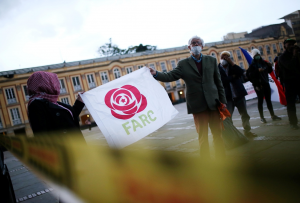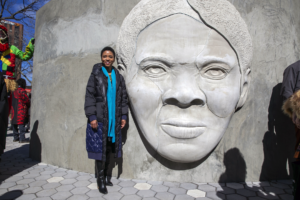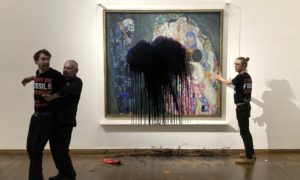Kenya Barris is obsessed with racial essentialism, but black people have moved on
Each episode of #blackAF, Netflix’s new comedy from Kenya Barris, gets introduced with rapper Jay Rock’s “Win.”
“You either with me or against me,” blares Jay Rock, as a montage of black luminaries fills up the screen.
I’m not against Barris per se, but I am certainly against the myopia of his latest project.
Season one of #blackAF begins streaming Friday on Netflix, one of the projects to come out of the $100 million deal Barris inked in 2018. It stars Barris as himself and Rashida Jones as his wife, Joya, in another comedy culled from Barris’ own life, this time dressed up in Curb Your Enthusiasm drag. (For the sake of clarity, from this point on, when I say “Barris,” I’m referring to the real-life writer and creator of the show. I’ll say “Kenya” to refer to the character in #blackAF.)
The show takes place in the Barris household, where Drea (Iman Benson), one of Kenya and Joya’s six children, is filming a documentary about her family with the intention of including it in her application package to New York University film school.
Upon learning of her intentions, Kenya equips Drea with a studio, copious production equipment and a seven-person camera crew. Through eight episodes (I’ve seen five), Drea captures her father’s various anxieties, which he claims stem from one place: slavery.
It becomes apparent that Barris has created a show with no real thesis or analysis, other than tangentially tying his own First World problems to structural racism with the world’s most tenuous spool of string. This is not to say that wealthy black people don’t experience racism, because they do.
But Barris insists on branding his show about a narcissistic, malcontent father who obsesses about his blackness and the blackness of his family, as a show about blackness, when those two things aren’t actually the same. #blackAF isn’t a show about blackness, it’s a show about one person’s near-pathological need to keep up appearances. It’s a conceit that has legs — there’s an entire genre of television farces built around that very thing, from Veep to Keeping Up Appearances to Jeeves and Wooster to Avenue 5.
#blackAF struggles to get beyond Barris’ penchant for self-aggrandizement, even though it’s supposedly filmed through the eyes of his documentarian daughter, which is how it fails where those other comedies succeed. It’s a microgenre that requires an intense level of critical self-awareness, and that’s the thing #blackAF lacks.
Take, for example, an episode in which Kenya and Joya can’t stop wringing their hands about their 13-year-old dancing with her friends to a City Girls song and posting the video to social media. Joya goes on a didactic tangent about a real issue: the adultification of black girls and the problems that come with it. Joya even throws in a reference to Hottentot Venus. But the show is completely blinkered when it comes to the ways that class gives the Barris family a foot up, and that’s where its self-aware shtick begins to fall apart.
“As a black girl, you don’t get looked at the same as these white girls who have purple hair,” Kenya tells another daughter when he sees her at a music festival. It completely escapes him that the problems he’s constantly obsessing about don’t necessarily apply to the Barris children in the same way that they apply to average black girls. Statistically speaking, most black girls are not worried about whether their parents will burn through their trust funds.
There’s another thing that makes this show a poor facsimile of Curb Your Enthusiasm: There’s no Susie Essman equivalent to remind Kenya that he’s full of it. Drea comes closest, but she lacks the authority and perspective of adulthood. Kenya’s obsessed with black essentialism, but not enough to realize that it’s not nearly the problem he makes it out to be. So his random, mundane issues get shoehorned into unrelated things, like Juneteenth. Kenya says that he’s constantly thinking about the white gaze, but that’s just an excuse to avoid any real self-examination, especially since he never delves deeper into any of the issues surrounding race that he brings up.

Even with all of these issues, Jones acquits herself as well as she can with a vapid goofiness that mostly hinges on her inability to dance well. Barris, as an actor, is flat on screen. What’s especially frustrating is that these topics are stale — Baratunde Thurston published How to Be Black in 2012. Ta-Nehisi Coates excoriated President Barack Obama for his condescension and for trafficking in outdated racial essentialism in 2013.
Black people have moved on. Kenya Barris has not.
The fifth episode is about Barris’ discomfort with seeking — and needing — the honest approval of white critics. Barris attends a screening of an unnamed film by a black director. He hates it, and he can’t understand why anyone would like it or see it as quality cinema. And the fact that his own family likes the film drives him crazy. After a quick trip to New York to visit Tyler Perry, Barris decides to dismiss critics altogether and convenes a video call with Tim Story, Issa Rae, Will Packer, Ava DuVernay and Lena Waithe to parse his feelings about being publicly honest about film and television made by black people.
“We do it all the time with white stuff,” he says. “Why can’t we do it with our own stuff?”
Like so much of #blackAF, Barris’ argument hinges on a straw man. In the case of the fifth episode, where Barris postulates that black artists don’t receive an honest critique of their work, he conveniently elides the existence of black critics such as Angelica Jade Bastién, Melanie McFarland, Cate Young, Eric Deggans, Robert Daniels, Candice Frederick, Malcolm Venable, Hannah Giorgis, Doreen St. Felix, Wesley Morris, Jenna Wortham and Joelle Monique.
Before Barris — or the character he plays — whines about how impossible it is to get an honest assessment of his work from people who look like him, he might want to remember that black critics exist. Whether or not he takes heed of their words is up to him.




